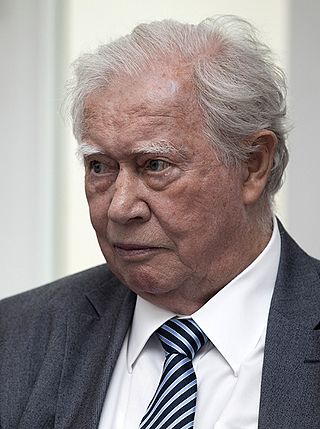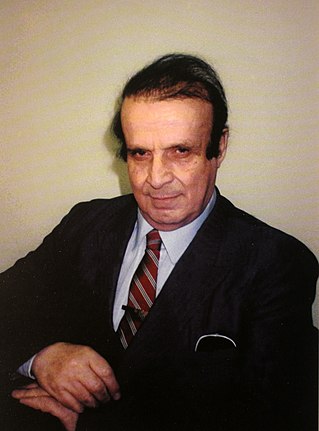Related Research Articles

Sir Ian Kershaw is an English historian whose work has chiefly focused on the social history of 20th-century Germany. He is regarded by many as one of the world's foremost experts on Adolf Hitler and Nazi Germany, and is particularly noted for his biographies of Hitler.
The Historikerstreit was a dispute in the late 1980s in West Germany between conservative and left-of-center academics and other intellectuals about how to incorporate Nazi Germany and the Holocaust into German historiography, and more generally into the German people's view of themselves. The dispute was initiated with the Bitburg controversy, which related to a commemorative service at a German military cemetery where members of the Waffen-SS were buried. The service was attended by President of the United States Ronald Reagan, who had been invited by the West German Chancellor Helmut Kohl. The Bitburg ceremony was widely interpreted in Germany as the beginning of the "normalization" of the nation's Nazi past, and inspired a slew of criticisms and defenses that made up the initiating arguments of the Historikerstreit. The dispute quickly outgrew the initial context of the Bitburg controversy, however, and became a series of broader historiographic, political, and critical debates about how the episode of the Holocaust should be understood in Germany's history and identity.
Timothy Wright Mason was an English Marxist historian of Nazi Germany. He was one of the founders of the History Workshop Journal and specialised in the social history of the Third Reich. He argued for the "primacy of politics," i.e., that the Nazi government was "increasingly independent of the influence of the [German] economic ruling classes," and believed the Second World War had been triggered by an economic crisis inside Germany.

Hans Mommsen was a German historian, known for his studies in German social history, for his functionalist interpretation of the Third Reich, and especially for arguing that Adolf Hitler was a weak dictator. Descended from Nobel Prize-winning historian Theodor Mommsen, he was a member of the Social Democratic Party of Germany.
The functionalism–intentionalism debate is a historiographical debate about the reasons for the Holocaust as well as most aspects of the Third Reich, such as foreign policy. It essentially centres on two questions:
Martin Broszat was a German historian specializing in modern German social history. As director of the Institut für Zeitgeschichte in Munich from 1972 until his death, he became known as one of the world's most eminent scholars of Nazi Germany.

Vahakn Norair Dadrian was an Armenian-American sociologist and historian, born in Turkey, professor of sociology, historian, and an expert on the Armenian genocide.

Ernst Nolte was a German historian and philosopher. Nolte's major interest was the comparative studies of fascism and communism. Originally trained in philosophy, he was professor emeritus of modern history at the Free University of Berlin, where he taught from 1973 until his 1991 retirement. He was previously a professor at the University of Marburg from 1965 to 1973. He was best known for his seminal work Fascism in Its Epoch, which received widespread acclaim when it was published in 1963. Nolte was a prominent conservative academic from the early 1960s and was involved in many controversies related to the interpretation of the history of fascism and communism, including the Historikerstreit in the late 1980s. In later years, Nolte focused on Islamism and "Islamic fascism".

Guenter Lewy is a German-born American author and political scientist who is a professor emeritus of political science at the University of Massachusetts Amherst. His works span several topics, but he is most often associated with his 1978 book on the Vietnam War, America in Vietnam, and several controversial works that deal with the applicability of the term genocide to various historical events, where Lewy denies both the Romani genocide and the Armenian genocide.

Yair Auron is an Israeli historian, scholar and expert specializing in Holocaust and genocide studies, racism and contemporary Jewry. Since 2005, he has served as the head of the Department of Sociology, Political Science and Communication of The Open University of Israel and an associate professor.
The assertion that the Holocaust was a unique event in human history was important to the historiography of the Holocaust, but it has come under increasing criticism in the twenty-first century. Related claims include the claim that the Holocaust is external to history, beyond human understanding, a civilizational rupture, and something that should not be compared to other historical events. Uniqueness approaches to the Holocaust also coincide with the view that antisemitism is not another form of racism and prejudice but is eternal and teleologically culminates in the Holocaust, a frame that is preferred by proponents of Zionist narratives.
Hans-Lukas Kieser is a Swiss historian of the late Ottoman Empire and Turkey, Professor of modern history at the University of Zurich and president of the Research Foundation Switzerland-Turkey in Basel. He is an author of books and articles in several languages.

Genocide studies is an academic field of study that researches genocide. Genocide became a field of study in the mid-1940s, with the work of Raphael Lemkin, who coined genocide and started genocide research, and its primary subjects were the Armenian genocide and the Holocaust; the Holocaust was the primary subject matter of genocide studies, starting off as a side field of Holocaust studies, and the field received an extra impetus in the 1990s, when the Bosnian genocide and Rwandan genocide occurred. It received further attraction in the 2010s through the formation of a gender field.

Talaat Pasha: Father of Modern Turkey, Architect of Genocide is a 2018 academic book by Hans-Lukas Kieser, published by Princeton University Press. It is a biography of Talaat Pasha. As of 2018 there had been no recent biographies of Talaat, nor of Enver Pasha, in western European languages. The book discusses the author's thesis that Talaat was co-Father of the Nation to modern Turkey along with Mustafa Kemal Atatürk, as well as Talaat's rule and significance. It also mentions his assassination by Armenian assassin Soghomon Tehlirian.
Stefan Ihrig is an academic, author, and speaker. He is professor of history at the University of Haifa and director of the Haifa Center for German and European Studies. His research interests are European and Middle Eastern history, with a focus on media and political and social discourse. His 2014 and 2016 books dealing with German-Turkish history and entanglement have elicited critical praise. He is also an editor of the Journal of Holocaust Research published by the University of Haifa and has contributed articles for HuffPost, Tablet, Haaretz, and History Today, among other publications.
Bibliography of the Armenian genocide is a list of books about the Armenian genocide:

The relationship between the Armenian genocide and the Holocaust has been discussed by scholars. The majority of scholars believe that there is a direct causal relationship between the Armenian genocide and the Holocaust, however, some of them do not believe that there is a direct causal relationship between the two genocides.

During World War I, Germany was a military ally of the Ottoman Empire, which perpetrated the Armenian genocide. Many Germans present in eastern and southern Anatolia witnessed the genocide, but censorship and self-censorship hampered these reports, while German newspapers reported Ottoman denials of the genocide. Approximately 800 officers and 25,000 soldiers of the Imperial German Army were sent to the Middle Eastern theatre of World War I to fight alongside the Ottoman Army, with German commanders serving in the Ottoman high command and general staff. It is known that individual German military advisors signed some of the orders that led to Ottoman deportations of Armenians, a major component of the genocide.

Differing views of what caused the Armenian genocide include explanations focusing on nationalism, religion, and wartime radicalization and continue to be debated among scholars. In the twenty-first century, focus has shifted to multicausal explanations. Most historians agree that the genocide was not premeditated before World War I, but the role of contingency, ideology, and long-term structural factors in causing the genocide continues to be discussed.
This is a select annotated bibliography of scholarly English language books and journal articles about the subject of genocide studies; for bibliographies of genocidal acts or events, please see the See also section for individual articles. A brief selection of English translations of primary sources is included for items related to the development of genocide studies. Book entries may have references to journal articles and reviews as annotations. Additional bibliographies can be found in many of the book-length works listed below; see Further Reading for several book and chapter-length bibliographies. The External links section contains entries for publicly available materials on the development of genocide studies.
References
- ↑
- Zimmermann, Moshe (2014). "Stationen kumulativer Radikalisierung. Das Editionsprojekt "Die Verfolgung und Ermordung der europäischen Juden durch das nationalsozialistische Deutschland"" [Stages of cumulative radicalization. The editorial project "The persecution and murder of European Jews by National Socialist Germany"]. Neue Politische Literatur (in German). 2014 (1): 10–22. doi:10.3726/91500_10.
- Vondung, Klaus (2010). "Debatten um den Holocaust und das Deutungskonzept der 'politischen Religion' der 'politischen Religion'" [Debates about the Holocaust and the interpretive concept of 'political religion' of 'political religion']. Zeitschrift für Literaturwissenschaft und Linguistik (in German). 40 (1): 9–22. doi:10.1007/BF03379665. ISSN 2365-953X. S2CID 164613710.
- "Hans Mommsen (1930–2015)". German History. 35 (2): 272–289. 1 June 2017. doi:10.1093/gerhis/ghx046.
Mommsen's concept of 'cumulative radicalization' was first proposed, I believe, in his 1976 entry for 'National Socialism' in the ninth edition of Meyers Enzyklopädisches Lexikon—the final edition of this venerable publication. His six-page essay, under the title 'Der Nationalsozialismus. Kumulative Radikalisierung und Selbstzerstörung des Regimes' ('National Socialism: Cumulative Radicalization and the Regime's Self-Destruction'), is a condensation of ideas that he had been developing since he had begun to work on the history of Nazism in the early 1960s; to appropriate John Stuart Mill's phrase, it appears as a kind of 'intellectual pemmican', almost too dense to digest... Mommsen's Third Reich is an object lesson in how conservative elites chose compromise with regimes of totalitarian terror, why they failed to resist and how difficult it therefore was for domestic forces to dislodge this kind of terroristic regime— unless it could be toppled by its own excessive ambitions, in the parasitic dynamic indicated by the essay's title.
- Browning, Christopher R. (2013). "Nazi Policy on the Eastern Front, 1941: Total War, Genocide, and Radicalization ed. by Alex J. Kay, Jeff Rutherford, and David Stahel". German Studies Review . 36 (3): 723–724. doi:10.1353/gsr.2013.0107. S2CID 159557941.
- "Hans Mommsen (1930–2015) A History of Cumulative Radicalization | www.yadvashem.org". Yad Vashem . Retrieved 11 January 2021.
- ↑
- Melson, R. (2013). "Recent Developments in the Study of the Armenian Genocide". Holocaust and Genocide Studies . 27 (2): 313–321. doi:10.1093/hgs/dct036.
- Schrodt, Nikolaus (2014). Modern Turkey and the Armenian Genocide: An Argument About the Meaning of the Past. Springer. pp. 246–247. ISBN 978-3-319-04927-4.
- Bloxham, Donald (2003). "The Armenian Genocide of 1915-1916: Cumulative Radicalization and the Development of a Destruction Policy". Past & Present (181): 141–191. doi:10.1093/past/181.1.141. ISSN 0031-2746. JSTOR 3600788.
- Melson, Robert (2015). "Contending Interpretations Concerning the Armenian Genocide: Continuity and Conspiracy, Discontinuity and Cumulative Radicalization". Genocide Studies International . 9 (1): 10–21. doi:10.3138/gsi.9.1.02. S2CID 145397509.